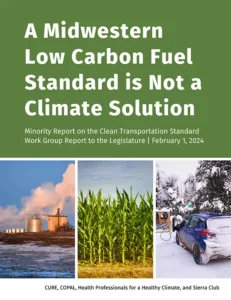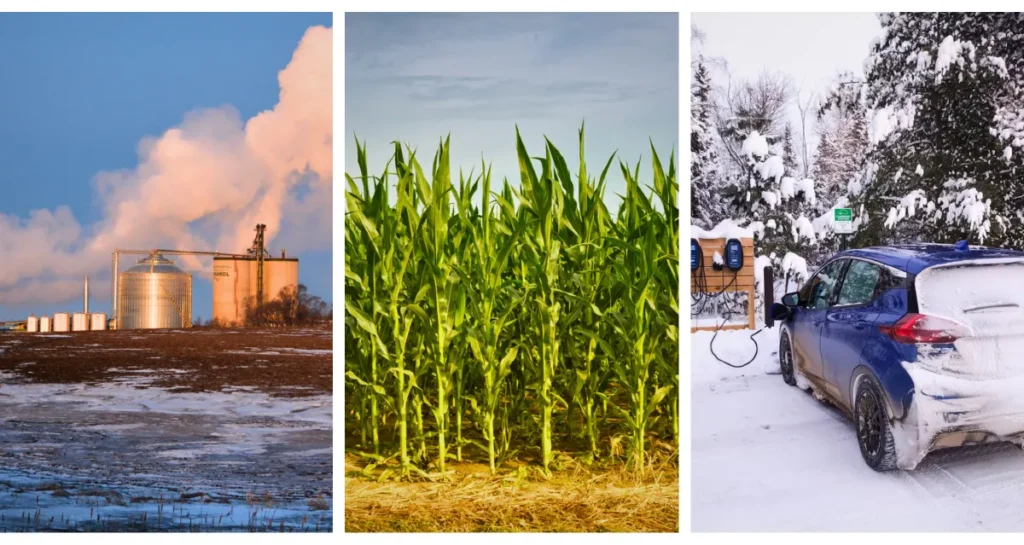 On February 1, 2024, four organizations published a Minority Report entitled “A Midwestern Low Carbon Fuel Standard is Not a Climate Solution: Minority Report on the Clean Transportation Standard Work Group Report to the Legislature” in response to the fuels report released by several state agencies and the Clean Transportation Standard (CTS) Work Group. The Minority Report details the reasons a Low Carbon Fuel Standard (LCFS) will not be a climate solution but will have negative environmental impacts by incentivizing both increased ethanol production and the carbon pipeline proposed to run through Minnesota to North Dakota. The Minority Report also describes flaws in the Work Group process.
On February 1, 2024, four organizations published a Minority Report entitled “A Midwestern Low Carbon Fuel Standard is Not a Climate Solution: Minority Report on the Clean Transportation Standard Work Group Report to the Legislature” in response to the fuels report released by several state agencies and the Clean Transportation Standard (CTS) Work Group. The Minority Report details the reasons a Low Carbon Fuel Standard (LCFS) will not be a climate solution but will have negative environmental impacts by incentivizing both increased ethanol production and the carbon pipeline proposed to run through Minnesota to North Dakota. The Minority Report also describes flaws in the Work Group process.
The CTS Work Group was formed by several state agencies including the Department of Agriculture, Department of Transportation, and the Pollution Control Agency. In 2023, the Minnesota Legislature directed the agencies to manage the work group and report back to the legislature by February 1, 2024. All four signatories to the Minority Report were members of the CTS Work Group.
Ethanol is Likely 24% Worse than Gasoline
The Minority Report noted a recent study from the University of Wisconsin which “… found that the carbon intensity of corn ethanol produced under the Renewable Fuel Standard (RFS) is no less than gasoline and likely at least 24% higher.”
The Minority Report noted that the “LCFS is, like ethanol itself, out of date.” They have both been left behind by electrification. “Electric vehicles (EVs) are already significantly less polluting today and this existing advantage for EVs over vehicles with internal combustion engines will only grow as our electric grid continues to decarbonize.”
Perverse Incentives to Never Stop Polluting
The proposed LCFS could actually worsen the climate crisis, the Minority Report explained, by delaying real climate action and by extending the economic lifespan of fossil fuels. “Further commodification of CO2 (pollution from ethanol plants) creates a perverse economic incentive to never stop producing CO2, a cycle which has been described as “the more you burn, the more you earn.”” The Report further notes “economic effects such as these are not included” in the recommended model to estimate emissions.
Enhanced Oil Recovery
The Minority Report explains how and why oil and ethanol industries mutually benefit from their plan to capture carbon emissions from ethanol plants. The report also notes that “the captured carbon would be piped to North Dakota where it will almost certainly be used to push more oil out of the ground in a process called enhanced oil recovery (EOR)”
“We have heard again and again from fossil fuel interests that they are going to need CO2 to continue pushing oil out of depleted wells,” said Sarah Mooradian, Government Relations and Policy Director for CURE. “Ensuring the continued availability of a pure stream of CO2 from ethanol plants is an essential part of their game plan. These gigantic corporations don’t care about the long-term success of our farmers, and instead hope to ensure their reliance on a single crop for decades to come.”
Impacts on Water & Soil
When an LCFS was considered in previous sessions of the legislature, multiple legislators and organizations expressed concern that an LCFS fails to consider other environmental impacts of biofuel production and consumption.
Kathleen Schuler, MPH, Policy Director for Health Professionals for a Healthy Climate, explains that, “The climate crisis demands a swift reduction in carbon emissions to save lives.” Schuler continued, “An LCFS perpetuates the harms of fossil fuels and ethanol, which we know are responsible for significant air, soil, and water pollution, not to mention the contamination of drinking water due to pesticides and nitrates.”
The Minority Report added, “Rural communities in Minnesota disproportionately suffer the air and water pollution emitted from the increased use of pesticides and chemical fertilizers associated with ethanol production. Pesticides contaminate water, soil, and air and pose the most risk to agricultural workers and their families.”
One Area of Agreement
The Minority Report noted that, “industry representatives have also repeatedly argued that they cannot meet the carbon reduction targets… This isn’t surprising, given that making such reductions could hurt their bottom line… In one key regard, we agree with the industry representatives. They do not think they can meet the targets with their technologies and this LCFS tool. And we agree. So we must change the technologies and tools, not the targets.”
Peter Wagenius, Legislative Director of the Sierra Club North Star Chapter said, “Our Legislature passed historic climate bills in 2023 and we need to stay focused on real solutions. We just do not have time for more ethanol, more pipelines or carbon shell games from the unholy alliance of the oil and ethanol industries. Helping to extend the lifespan of polluting liquid fuels is not the answer.”


